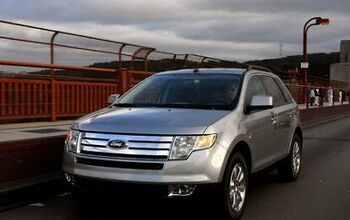By the Numbers: July Sizzles, Sales Fizzle
July's temperatures may have been hotter than Hell, but U.S. new car sales were in Hell. Rising gas prices have thrown the entire American auto industry into turmoil, flooding the market with used SUVs and pickups, cratering residual values and trapping millions of consumers in light truck limbo. At the same time, automakers can't ramp-up production quickly enough on those fuel-sipping models that are leaving the lots. Incentives aren't moving the metal, but NOT increasing them would be worse. The downturn is widespread. And despite what the automakers say, it's going to get worse. Soon. For now, here's the damage report.
Overall, U.S. light vehicle sales were down 13.2 percent from last July, down 10.5 percent overall from last year. That breaks down into a 0.3 percent drop in passenger cars and a 25.8 percent drop in truck sales. Year to date (YTD), car sales are down only 1.5 percent. But Detroit's still-truck-centric Big 2.8 are taking it on the chin, with truck sales off by 19.3 percent.
Family Sedans
Chevy's Malibu* continues its strong showing against last year's lackluster model; up 78.6 percent in July and 37 percent YTD. Ford's Fusion also booked a healthy increase, up 13.5 percent for the month, 11.9 percent for the year. Chrysler's 300 continues its slide into the dumpster, dropping 57.6 percent below last July and 39.1 YTD. The Toyota Camry* leveled off, finishing July 1.5 percent; it's a wash YTD. Honda Accord sales continue to outpace last year, finishing the month 11.4 percent ahead and 12.6 percent better YTD.
Compacts
Compacts' popularity continue to soar. The Chevy Cobalt was up 3.5 percent, 16.4 percent YTD. The Focus is once again Ford's most popular car, racking up 15.6 percent more sales, up a full 26.2 percent YTD. The Dodge Caliber bucked the trend, dropping 9.4 percent for the month, down 1.2 percent YTD. The Toyota Corolla** increased sales by 15.9 percent, but fell down 1.3 percent YTD. The Honda Civic* was up 4.6 percent, 16.1 percent YTD. The Nissan Sentra finished the month up 16 percent, 5.3 percent YTD.
Subcompacts
The up-and-down Chevy Aveo was up 16.9 percent ahead of last July, but only 1.4 percent YTD. Toyota's Yaris showed a 6.1 percent increase for the month and a 34.1 percent jump YTD. The Honda Fit also experienced a meteoric rise. Sales were up a staggering 93.4 percent in July, 72.9 percent YTD. Nissan's Versa rose 14.4 percent above last July, up 19.6 percent YTD.
Prius
Toyota Prius ' demand continues to outstrip supply. Sales in July were down 8 percent from last July. Annual sales are down 3.9 percent.
Pickup Trucks
And now the bad news… Chevy's Silverado* plunged 29.8 percent from last July, down 26.1 percent YTD. The Ford F-Series isn't doing quite as badly. Sales off 20.6 percent on the month, down 22.4 percent on the year. Even with dealers running half price sales, the Dodge Ram sank 27.2 percent, down 30.0 percent YTD. They're all doing better than the Tundra. ToMoCo's full-size pickup dropped 42.1 percent from last July. Sales are down 15.2 percent from last year.
Truck-Based SUVs
There's only one thing that can make pickup sales look good: SUV sales. Chevy's Tahoe* is down 35.1 percent for the month, off 27.8 percent YTD. The Ford Explorer has lost its way, finishing the month down 51.8 percent, minus 35.6 percent YTD. The biggest loser: the Durango. The Dodge Boys sold all of 384 units in July. Sales tumbled 84.5 percent, down 51.3 percent YTD. Toyota Sequoia sales continue growing, with an increase of 62.9 percent from last July, up 32.8 YTDr.
CUVs
The once and future Next Big Thing wasn't. Sales of the GMC Acadia, the best selling of the Lambdas triplets (soon to be quints), dropped 5.2 percent. Healthy sales from earlier in 2008 kept the model 6.6 percent ahead of last year. The Ford Edge continues edging down, dropping 6.5 percent. Again, it's a recent phenom; sales are up 13.8 percent YTD. Even with a hybrid model available, the Toyota Highlander* dropped to its lowest level in three years. July sales slid 23.7 percent, down 7.4 percent YTD. The Pilot made a strong "contribution" to Honda's 22 percent drop in truck sales; it was off 43 percent, down 21.1 percent YTD.
By Manufacturer
Deep breath. GM sales plunged 26.1 percent for the month, down 17.7 percent YTD. Ford had the best showing of the D3, dropping "only "17.1 percent. Year to date, they're off 14.8 percent. Chrysler didn't have a lot to start with, but they still managed to finish 28.8 percent below last July. For the year, ChryCo is down 22.8 percent. Toyota's starting to get used to the negative side of the sales ledger, falling 11.9 percent, down 7.6 percent below last year's mark. And, showing they're not invulnerable, Honda lost 1.6 percent from last July. They're still 3.2 percent ahead of last year.
Down the Road
Here come the "please God clear this lot of '08s" rebates and incentives. While Toyota, Honda and others are selling all the small cars they can produce, GM, Ford and Chrysler can only respond to current demand with the promise of new, highly competitive small cars. They won't come on-stream in force until 2010. Meanwhile, August is going to be brutal and then… winter. What's beyond brutal?
*Include Hybrid models
More by Frank Williams
Latest Car Reviews
Read moreLatest Product Reviews
Read moreRecent Comments
- W Conrad I'm not afraid of them, but they aren't needed for everyone or everywhere. Long haul and highway driving sure, but in the city, nope.
- Jalop1991 In a manner similar to PHEV being the correct answer, I declare RPVs to be the correct answer here.We're doing it with certain aircraft; why not with cars on the ground, using hardware and tools like Telsa's "FSD" or GM's "SuperCruise" as the base?Take the local Uber driver out of the car, and put him in a professional centralized environment from where he drives me around. The system and the individual car can have awareness as well as gates, but he's responsible for the driving.Put the tech into my car, and let me buy it as needed. I need someone else to drive me home; hit the button and voila, I've hired a driver for the moment. I don't want to drive 11 hours to my vacation spot; hire the remote pilot for that. When I get there, I have my car and he's still at his normal location, piloting cars for other people.The system would allow for driver rest period, like what's required for truckers, so I might end up with multiple people driving me to the coast. I don't care. And they don't have to be physically with me, therefore they can be way cheaper.Charge taxi-type per-mile rates. For long drives, offer per-trip rates. Offer subscriptions, including miles/hours. Whatever.(And for grins, dress the remote pilots all as Johnnie.)Start this out with big rigs. Take the trucker away from the long haul driving, and let him be there for emergencies and the short haul parts of the trip.And in a manner similar to PHEVs being discredited, I fully expect to be razzed for this brilliant idea (not unlike how Alan Kay wasn't recognized until many many years later for his Dynabook vision).
- B-BodyBuick84 Not afraid of AV's as I highly doubt they will ever be %100 viable for our roads. Stop-and-go downtown city or rush hour highway traffic? I can see that, but otherwise there's simply too many variables. Bad weather conditions, faded road lines or markings, reflective surfaces with glare, etc. There's also the issue of cultural norms. About a decade ago there was actually an online test called 'The Morality Machine' one could do online where you were in control of an AV and choose what action to take when a crash was inevitable. I think something like 2.5 million people across the world participated? For example, do you hit and most likely kill the elderly couple strolling across the crosswalk or crash the vehicle into a cement barrier and almost certainly cause the death of the vehicle occupants? What if it's a parent and child? In N. America 98% of people choose to hit the elderly couple and save themselves while in Asia, the exact opposite happened where 98% choose to hit the parent and child. Why? Cultural differences. Asia puts a lot of emphasis on respecting their elderly while N. America has a culture of 'save/ protect the children'. Are these AV's going to respect that culture? Is a VW Jetta or Buick Envision AV going to have different programming depending on whether it's sold in Canada or Taiwan? how's that going to effect legislation and legal battles when a crash inevitibly does happen? These are the true barriers to mass AV adoption, and in the 10 years since that test came out, there has been zero answers or progress on this matter. So no, I'm not afraid of AV's simply because with the exception of a few specific situations, most avenues are going to prove to be a dead-end for automakers.
- Mike Bradley Autonomous cars were developed in Silicon Valley. For new products there, the standard business plan is to put a barely-functioning product on the market right away and wait for the early-adopter customers to find the flaws. That's exactly what's happened. Detroit's plan is pretty much the opposite, but Detroit isn't developing this product. That's why dealers, for instance, haven't been trained in the cars.
- Dartman https://apnews.com/article/artificial-intelligence-fighter-jets-air-force-6a1100c96a73ca9b7f41cbd6a2753fdaAutonomous/Ai is here now. The question is implementation and acceptance.


































Comments
Join the conversation
I'm looking to buy a new or used vehicle as a daily driver, so that I can park my Jeep Wrangler to build it up (and make it even suck more gas!). Anyway, I test drove a Civic Coup LX last Saturday. They had three on the lot, and the salesman told me he'd get me whatever I want and has called me twice since then. I told him that I'm not in a rush and really don't want to buy for several more months to give me time to look at other options. The Civic I test drove was fine and has great mpg, but it was slow and boring. Would be hard to go back... My other option is like a '98 to '01 Jeep Cherokee. I'm looking for deals now to move one off a lot! I would put up with the lower mpg then drive a Civic again (I had two once).
" Ford had the best showing of the D3, dropping "only "17.1 percent." Now that's what I love to hear, Ford's would be Panther replacement with more models is being outsold by the partially fleet only Panther YTD, with death lingering on the Sable and X.